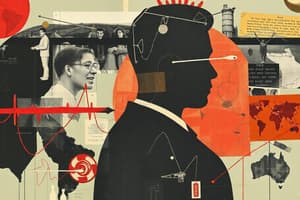Podcast
Questions and Answers
Which scenario best exemplifies a high power-distance culture?
Which scenario best exemplifies a high power-distance culture?
- Employees are encouraged to challenge their managers' decisions openly.
- A society where individuals freely question authority figures and demand justification for decisions.
- Teams make decisions collaboratively, and everyone's input is valued equally, regardless of their position.
- A workplace in India where employees show deference to their superiors and rarely question their decisions. (correct)
A company is expanding into China. Which communication strategy would be most effective, considering cultural context?
A company is expanding into China. Which communication strategy would be most effective, considering cultural context?
- Prioritizing direct and explicit written communication to avoid misunderstandings.
- Relying heavily on explicit verbal agreements and downplaying the importance of non-verbal cues.
- Building strong interpersonal relationships and paying close attention to non-verbal cues and implied meanings. (correct)
- Using straightforward language, focusing on verbal communication, and scheduling frequent meetings.
In a collectivist culture, which action would likely be most valued in the workplace?
In a collectivist culture, which action would likely be most valued in the workplace?
- Individual employees setting independent goals and pursuing them competitively.
- Employees prioritizing teamwork and collaboration to achieve shared objectives. (correct)
- Recognizing and rewarding employees solely based on their personal accomplishments.
- Encouraging employees to focus on individual tasks with minimal interaction with coworkers.
A U.S.-based company is opening a branch in Japan. What should the company consider regarding cultural differences in individualism and collectivism?
A U.S.-based company is opening a branch in Japan. What should the company consider regarding cultural differences in individualism and collectivism?
How does cultural heritage tourism impact local communities, considering the challenge of cultural commodification?
How does cultural heritage tourism impact local communities, considering the challenge of cultural commodification?
How does tourism contribute to intercultural understanding, and what is a potential drawback?
How does tourism contribute to intercultural understanding, and what is a potential drawback?
What characterizes the potential impact of cultural diversity on workplace environments?
What characterizes the potential impact of cultural diversity on workplace environments?
Considering Hofstede's cultural dimensions, how would decision-making processes likely differ between a high power-distance culture and a low power-distance culture?
Considering Hofstede's cultural dimensions, how would decision-making processes likely differ between a high power-distance culture and a low power-distance culture?
How did workforce diversity considerations evolve from the pre-industrial era to modern times?
How did workforce diversity considerations evolve from the pre-industrial era to modern times?
Which of the following is an accurate representation of the relationship between culture and an individual's behavior?
Which of the following is an accurate representation of the relationship between culture and an individual's behavior?
Flashcards
Culture
Culture
Shared practices, values, norms, language, and beliefs of a group shaping behaviors and perceptions.
Diversity
Diversity
Range of differences among people, including cultural, ethnic, racial, gender, socioeconomic, and religious variations.
Workplace
Workplace
An environment where individuals perform tasks for an organization, increasingly global with diverse cultural perspectives.
Individualism
Individualism
Prioritizes individual achievement and independence.
Signup and view all the flashcards
Collectivism
Collectivism
Values group harmony and collective well-being.
Signup and view all the flashcards
Power Distance
Power Distance
Acceptance of hierarchical structures varies across cultures.
Signup and view all the flashcards
High Power-Distance Cultures
High Power-Distance Cultures
Respect for authority is high.
Signup and view all the flashcards
Low Power-Distance Cultures
Low Power-Distance Cultures
Value equality is valued.
Signup and view all the flashcards
High-Context Communication
High-Context Communication
Relies heavily on non-verbal cues and implied meanings.
Signup and view all the flashcards
Low-Context Communication
Low-Context Communication
Prioritizes direct and explicit communication.
Signup and view all the flashcardsStudy Notes
- Culture includes shared practices, values, norms, language, and beliefs that shape behaviors and are passed down through generations, influencing how individuals perceive and interact with each other.
- Diversity includes cultural, ethnic, racial, gender, socioeconomic, and religious differences, which are valued as vital components of human identity.
- A workplace involves individuals collaborating to perform tasks for an organization.
- Workplaces are becoming global spaces requiring effective integration of diverse cultural perspectives.
Cultural Perspectives
- Cultural perspectives influence communication styles, decision-making, teamwork, and conflict resolution.
- Individualistic cultures prioritize achievement and independence (e.g., the U.S.).
- Collectivist cultures value harmony and collective well-being (e.g., Japan).
- Cultures vary in their acceptance of hierarchical structures.
- High power-distance cultures show respect for authority (e.g., India).
- Low power-distance cultures value equality (e.g., Denmark).
- High-context cultures rely on non-verbal cues and implied meanings (e.g., China).
- Low-context cultures prioritize direct and explicit communication (e.g., Germany).
Culture and Tourism
- Cultural diversity in tourism enhances intercultural exchange and attracts travelers seeking unique experiences.
- Cultural heritage tourism involves tourists visiting destinations to explore cultural heritage, traditions, and historical landmarks.
- Tourism fosters interactions that promote understanding and reduce biases between hosts and visitors.
- Tourism can lead to traditions being altered to meet demands, potentially eroding authenticity.
Historical Perspective of Diversity in the Workforce
- The study of diversity in the workforce has evolved over time.
- In the pre-industrial era workforce diversity was limited because most labor was local and homogenous.
- The Industrial Revolution brought diverse cultural groups into factories and cities which introduced integration and equality challenges.
- Social movements in the U.S. and globally highlighted the need for inclusivity and equal opportunities in the Civil Rights Movement in the 1960s.
- In the 21st century globalization and remote work environments have amplified the significance of cultural diversity in the workforce.
Studying That Suits You
Use AI to generate personalized quizzes and flashcards to suit your learning preferences.




